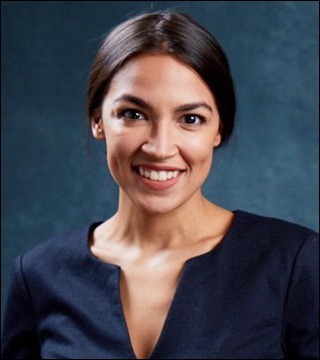By Jim Ellis

The top Democratic fundraiser in the House for Q2 was New York freshman Rep. Alexandria Ocasio-Cortez (D-Bronx), with $1.22 million raised from April 1 – June 30.
The Daily Kos Elections site surveyed the entire House universe and segmented the large group into a competitive race category. They find 158 House incumbents who will be in a competitive 2020 campaign or have the potential of being in one at this point in time.
Within this incumbent segment, the aggregate amount raised is over $61.4 million for the second quarter period ending June 30. As one would expect, the majority Democratic members had the larger haul, $39.4 million for the 94 Democrats surveyed as compared to $21.9 million for 64 Republicans. The average amount a Democratic member raised was just over $419,000 as compared to $342,000 for Republicans.
As was the case in 2018, when fundraising records were shattered for US House incumbents and candidates, this election cycle appears to be again featuring candidates who are prolific in this campaign element. For the campaign cycle-to-date aggregate figure, meaning the amount of money raised from Nov. 9, 2018, the day after the last general election, to June 30, 2019, these same incumbents have raised over $135 million, meaning an average of just under $855,000 per member.
For the 94 Democratic incumbents isolated for this report, just over $75 million was raised campaign-to-date, for an average of almost $798,000 per member. The 64 Republicans attracted an aggregate $41.4 million, with an average of $646,000 raised CTD.
In terms of current cash-on-hand, the average competitive, or potentially competitive, Democratic House incumbent posted almost $1 million CoH, or $987,000. Their Republican counterparts averaged $657,000. While Democrats have a clear money advantage, is it equally evident that the GOP candidates will also have more than enough to communicate their message. These figures obviously do not include the large amount of money that outside organizations will raise and spend independently to boost their favored candidates of both parties.
The known challengers, not surprisingly, reported raising much less, but still rather impressive amounts. For the quarter, the combined Democratic and Republican challengers raised an aggregate $25.1 million, or an average of $159,000 per campaign. In terms of cash-on-hand, the average challenger holds $183,000. The campaign-to-date numbers don’t differ much from those just reported since most challengers only filed their campaign committees during the second quarter.
The money difference always favors incumbents, and certainly the 2020 cycle is clearly no exception to this trend, as this is especially true in the early part of the two-year campaign period. But, even these challenger figures are much greater than what we are accustomed to seeing for off-year US House candidates.
The top 10 fundraisers were not surprisingly dominated by majority Democrats. The Dems found eight of the top 10 money raisers as members of their party; the two raising the most are a pair of the most prominent incumbents.
The most prolific House member in terms of dollars raised in the second quarter was California Rep. Devin Nunes (R-Tulare/Fresno), the House Intelligence Committee chairman when the GOP held the majority. He raised a whopping $1.86 million just in Q2 alone and attracted $3.2 million campaign to date.
The top Democratic fundraiser was New York freshman Alexandria Ocasio-Cortez (D-Bronx), with $1.22 million raised from April 1 – June 30. She has broken the $2 million mark campaign-to-date.
Rounding out the top 10 second quarter fundraisers are Reps. Katie Porter (D-CA; $992,000), House Ways and Means Committee chairman Richard Neal (D-MA; $876,000), Dan Crenshaw (R-TX; $873,000), House Democratic Conference chairman Hakeem Jeffries (D-NY; $845,000), Josh Gottheimer (D-NJ; $844,000), Max Rose (D-NY; $799,000), Josh Harder (D-CA; $752,000), and Haley Stevens (D-MI; $735,000). Of the top 10, six are freshmen, which is a new all-time fundraising record.
